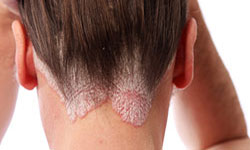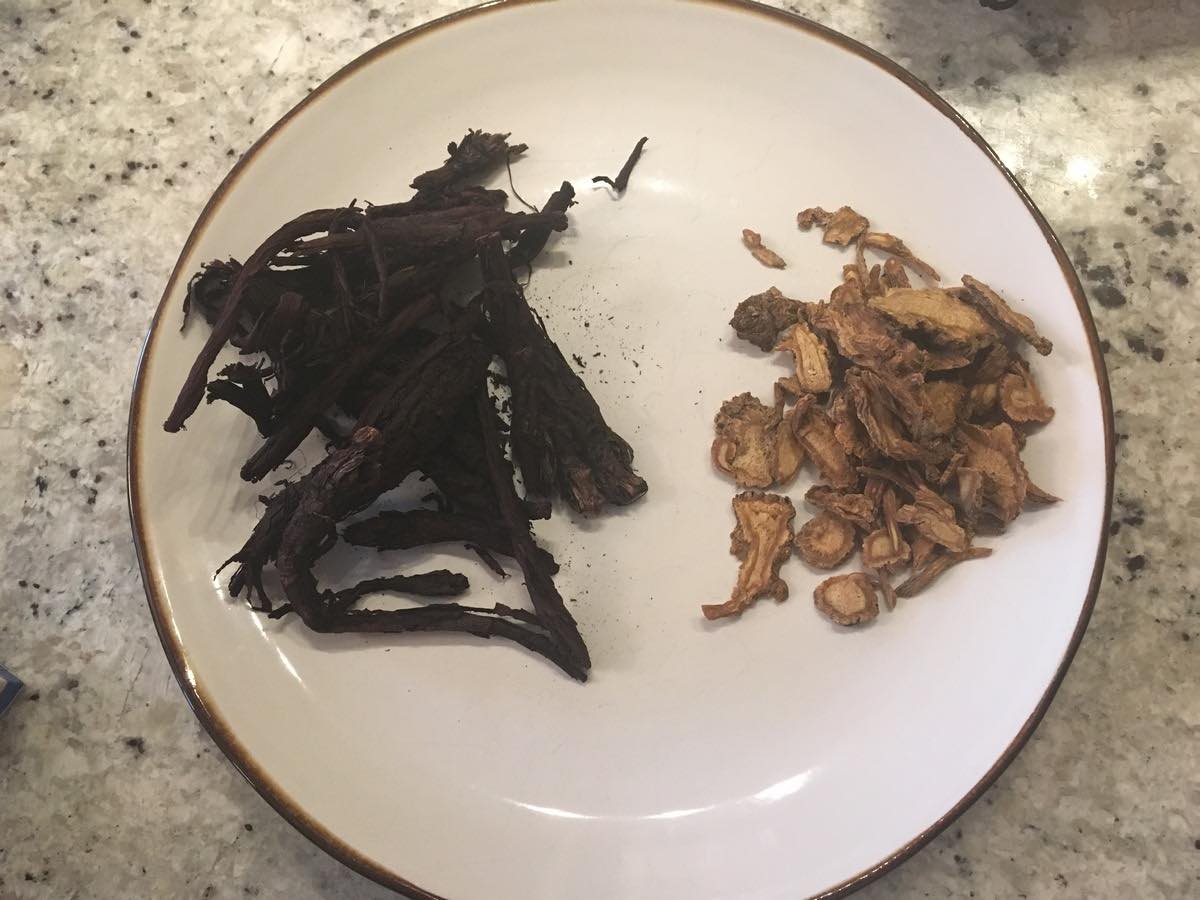Psoriasis
Traditional Chinese Medicine for Psoriasis
Chinese medicine therapies work by addressing the underlying imbalance causing your psoriasis. For autoimmune conditions like psoriasis, the concept of imbalances makes perfect sense. The imbalance leads to an autoimmune reaction causing red, raised skin (plaque) and flaky white scales. (1)
Once the imbalances are corrected, your body can work to heal itself and stay healthy. I like to say this is like hitting the reset switch. One of the phenomenal aspects of Traditional Chinese Medicine is that it can lead to long-term reduction in psoriasis.
Psoriasis is more than a skin condition. It can affect one’s confidence in social situations, causes stress, anxiety, and great physical discomfort.
After trying medications with harsh side effects and therapies that don’t work, many people turn to Traditional Chinese medicine which has been used to treat psoriasis and other skin conditions for thousands of years.

Chinese Medicine Dermatology
Symptoms
Psoriasis causes the formation of round and oval raised lesions. Often there is a silvery white scale over these lesions. Itching may occur and can be severe in certain cases, but not everyone will have an itch. In those with psoriasis, the lesion may appear at a site of physical trauma, which is called a Koebner phenomenon. Many people with psoriasis also suffer from chronic joint pain and arthritis.
Psoriasis tends to affect the outside of the arms and legs more than the inside. Common areas that are most affected by psoriasis are the back, elbows, scalp, groin area, fingernails, and toenails. Some medications and drugs may exacerbate the development of this condition.
There are many types of psoriasis, the most common type being chronic plaque psoriasis. This chronic form is the most common and the lesions may last for months, even years when they develop. This form reacts well to acupuncture and Chinese medicine treatment.
There are some acute inflammatory forms of psoriasis, which must be treated immediately by a physician or in the emergency department.
Our Approach
In our first consultation, we will review your complete medical history and the development of your psoriasis. The medical history and the appearance of your skin provide the information needed to identify the underlying imbalance causing the condition.
We will then use customized acupuncture, strong herbal teas called decoctions, and topical herbal medicine to treat your psoriasis. The therapies are customized to address the specific type of psoriasis you are experiencing. Chinese medicine can be effective for many types of psoriasis including plaque psoriasis, guttate, inverse, as well as palmopustular psoriasis.
In addition to my extensive clinical experience with the condition, I often speak on Chinese medicine for psoriasis and have published a number of articles on the subject.
Imbalances
In Chinese medicine, not all psoriasis is the same. The goal of treatment is to determine the specific imbalance underlying your condition. This is based on the appearance of psoriasis and the presence of any other symptoms, such as itch, pain, or irritation. Whole-body symptoms such as digestion, chronic sore throats, allergies, and colds are also considered.
The most common imbalances causing psoriasis are blood heat, dryness, and blood stagnation. Damp heat, qi stagnation, and heat toxicity can also be a factor, particularly in pustular psoriasis.
The determination of the underlying imbalance will guide the creation of the most effective herbal formula. Herbs and acupuncture are customized to each imbalance and quality of the skin. Taking the wrong formula will not work. If you have hot-type psoriasis, your herbal formula would consist of cold herbs that reduce the heat. If your psoriasis is from dryness, then herbs that moisten the skin will be used.
Blood Heat: Skin diseases caused by heat are reflected in redness on the skin. The size, shape, and shade of the red patches will indicate the level of heat. Blood heat is characterized by acute onset of psoriasis with possible severe itching. In blood level heat, dark red plaques will cover a great amount of skin. The size and extent of the lesions suggest the amount of heat. The greater the number, and the larger the lesions, the greater the degree of heat.
Blood Dryness: Blood dryness occurs with chronic cases of psoriasis. Itching may or may not be present. The lesions can appear pale or dull red in color. The scales may appear to be dryer with blood dryness.
Blood Stagnation: Blood stagnation also occurs when there is long-term chronic psoriasis. It is often characterized by cycles of remission and relapses. The plaques are irregular, hard, thick, and may be purplish in color.
Blood Toxicity: Extremely red lesions, psoriasis that is rapidly spreading, and the presence of pustules on the feet are signs of heat toxicity. Also, yellowish or brownish scaling shows the heat is strong and there is toxicity present.
Damp Heat: Damp heat is present mostly in inverse psoriasis and palmopustular psoriasis.
Acupuncture
Acupuncture is very helpful in treating psoriasis as it can reduce inflammation, itch, and pain as well as improve overall health (5). In addition, it can be very effective for relieving pain from psoriatic arthritis. Many patients use acupuncture along with Chinese Herbal Medicine.
Chinese Herbal Medicine
Chinese herbal medicine is most often given in multiherb formulas which are taken as a tea. Herbs are given in formulas consisting of 10-15 different herbs, each one having a healing function geared toward resolving the underlying imbalance. The ingredients are selected specifically for each patient based upon their symptoms. By combining the herbs, the formula works synergistically to target the imbalances underlying psoriasis.
TCM herbal medicine is a standard therapy for psoriasis throughout China.
There are hundreds of herbs used in Chinese medicine for treating psoriasis. Here is a profile of just a few common herbs used for different types of psoriasis. Many of the herbs for clearing heat have been shown to reduce inflammation. (7)

This article is for educational purposes only does not serve as medical advice. Please consult a Chinese Medicine Practitioner before taking Chinese herbal medicine.
For treating heat, the herbal formula will focus on herbs that are cooling. Sheng di huang (Rehmania glutinosa) and Zi cao (lithospermum erythrohizon) are both cooling herbs that are central in the treatment of heat. These herbs have been shown to reduce the inflammatory cytokine TNF-α, which is active in psoriasis.(3,8)
For addressing blood stagnation, the herbal formula will include herbs that nourish and stimulate the movement of blood. Dan shen (Salvia miltiorriza) is also known for moving and nourishing the blood. Dan shen has been shown to inhibit the secretion of inflammatory cytokines IFN-γ and IL-12 active in psoriasis.
Licorice root, or gan cao (Glycyrrhiza uralensis), is widely used in Chinese medicine for all types of psoriasis, as it boosts qi and harmonizes the effects of other herbs. It has long been known to not only reduce inflammation but also enhance the immune system. Studies show that it can also help to repair damaged liver cells.
Qing Dai (Indigo naturalis) is a traditional Chinese medicine that has been used for centuries to treat many skin conditions and inflammatory conditions. Some of its active components are indole and indirubin.
Many research trials show that Qing dai helps reduce psoriasis by reducing the inflammatory process in psoriasis. Additionally, the treatment is believed to have antiviral, antibacterial, and antifungal properties.
Diet
Diet can influence the development of psoriasis. Chinese medicine recommends staying away from rich, fatty foods especially seafood, and spicy foods because they cause the accumulation of heat in the body. We call these activating foods because they stimulate the flaring of heat.
A Mediterranean diet, rich in omega 3 from fish and vegetables, can be helpful in psoriasis symptoms.(9) Fish, which are rich in omega 3 fatty acids such as salmon and sardines, are important for maintaining healthy skin.
- Menter A, Stoff B. Psoriasis. London: Manson Pub.; 2011.
- Xu Y. Dermatology in Traditional Chinese Medicine. United Kingdom: Donica Publishing Ltd. ; 2004.
- Tse, T. W. Use of common Chinese herbs in the treatment of psoriasis. Clinical and Experimental Dermatology. 28: 5. 469-475. 2003.
- Yang X, Chongsuvivatwong V, McNeil E, et al. Developing a diagnostic checklist of traditional Chinese medicine symptoms and signs for psoriasis: a Delphi study. Chin Med. 2013; 8: 10. Published online 2013
- Jeon YC. Treatment for an Adult Patient With Psoriasis with Traditional Korean Medicine, Especially Sa-Am Acupuncture and Herbal Medicine. J Acupunct Meridian Stud. 2016;9(2):88-92.
- Ping S, Lysvand H, Yuhe Y, Wali L, Iversen OJ. Expression of the psoriasis-associated antigen, Pso p27, is inhibited by Traditional Chinese Medicine. Journal of Ethnopharmacology. 127 (2010) 171-174.
- Muluye RA, Bian Y, Alemu PN. Anti-inflammatory and Antimicrobial Effects of Heat-Clearing Chinese Herbs: A Current Review. J Tradit Complement Med. 2014 Apr;4(2):93-8.
- Deng S, May BH, Zhang AL, Lu C, Xue CC. Topical herbal formulae in the management of psoriasis: systematic review with meta-analysis of clinical studies and investigation of the pharmacological actions of the main herbs. Phytother Res. 2014;28(4):480-497.
- Millsop JW, Bhatia BK, Debbaneh M, Koo J, Liao W. Diet and psoriasis, part III: role of nutritional supplements.J Am Acad Dermatol. 2014 Sep;71(3):561-9. DOI
Feedback From our clients…
“I had been experiencing a recurring bout of psoriasis for year, and nothing offered much relief. I decided to try herbs. Joe is a great practitioner, listening to my symptoms to find the best treatment. My psoriasis is now in remission (finally!), and I’m grateful that I have a practitioner that I can see for any other problems that may come up. I very highly recommend Alban Acupuncture, and have and will continue to guide my friends to his practice.”
~ Sharon, NYC